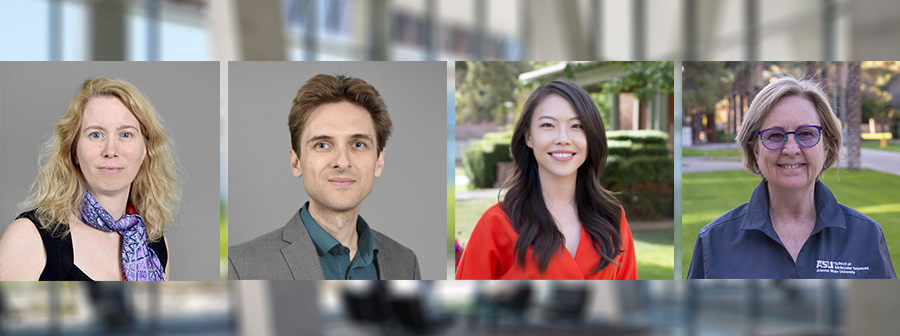American Chemical Society awards bridge program to ASU's School of Molecular Sciences

Professor Anne Jones (left) mentoring a student in her lab (prior to pandemic safety protocols) in ASU's School of Molecular Sciences. Photo credit: Mary Zhu
Arizona State University’s School of Molecular Sciences is one of three institutions nationwide selected this year to join the American Chemical Society’s Bridge Program.
Although underrepresented populations make up a third of college-age U.S. citizens, they only earn about 11% of U.S. chemistry PhDs. To address this gap and recognize ASU’s efforts to help all students succeed, the American Chemical Society has selected ASU’s School of Molecular Sciences as a site for its Bridge Program. ASU will receive funding from the ACS to set up a bridge site in the School of Molecular Sciences and to support at least two Bridge Fellows annually.
Many students find it difficult to jump directly from a more structured undergraduate degree to a research-based PhD program, but chemical sciences master’s degrees are uncommon. The School of Molecular Sciences Bridge Program will develop transitional master’s degrees in chemistry and biochemistry to provide a pathway for students from diverse backgrounds from baccalaureate degrees into PhD programs in chemical sciences. The evidence-based program consists of rigorous, graduate-level courses complemented by personal coaching and mentoring from a team of faculty and peers to ensure success.
“The ACS Bridge program recognizes that different students can take different pathways into science, especially those from underrepresented populations,” said President’s Professor Ian Gould, interim director of the School of Molecular Sciences. “The School of Molecular Sciences is leading the way in designing a new pathway into our PhD program for underrepresented students, and the ACS has recognized that this will have a real impact for real students.”
Leading the program at ASU is Professor Anne Jones, from the School of Molecular Sciences, who is also currently an ASU Provost Fellow.
“This project relies on a strong team of complementary and collaborative faculty dedicated to student success. We are excited to partner with the American Chemical Society to develop and disseminate best practices to improve graduate education in chemical sciences and at the same time to help individual students achieve their dreams,” Jones said.
Associate Professor Ryan Trovitch, with the School of Molecular Sciences, will manage the process of recruitment and selection of fellows and provide personalized coaching to fellows for their graduate applications.
“ASU is an ideal partner for the ACS Bridge Program given our school’s commitment to include underrepresented groups in research,” Trovitch said. “This program will offer students with less than perfect transcripts an opportunity to earn a fully funded MS degree while making significant contributions to experimental science. The students who participate in our Bridge Site will gain the expertise needed to earn a PhD in chemistry or biochemistry and become a leader in their chosen field.”

From left: Anne Jones, Ryan Trovitch, Ara Austin and Barbara Munk. Image credit: Mary Zhu
Clinical Assistant Professor Ara Austin, who is managing director of online programs for the School of Molecular Sciences and director of online engagement and strategic initiatives for The College of Liberal Arts and Sciences, will lead efforts to evaluate the impact of interventions developed for this program and recommend evidence-based modifications to improve outcomes.
Clinical Assistant Professor Barbara Munk is managing director of school operations in the School of Molecular Sciences. Together with Austin, Munk has built a very successful undergraduate peer mentoring program in the School of Molecular Sciences that links campus-immersion students with online learners. The program will be expanded to include peer-to-peer graduate mentoring as part of this project. Munk has worked extensively in industry, and she is currently a member of ASU’s Career and Professional Development Services advisory board, experience invaluable in mentoring graduate students.
The American Chemical Society Bridge Program is part of the larger Inclusive Graduate Education Network, a collaboration of more than 30 professional societies and institutions, leading a paradigm shift in increasing the participation of Black, Latino and Indigenous students in graduate programs in physical sciences.
More Science and technology

ASU-led space telescope is ready to fly
The Star Planet Activity Research CubeSat, or SPARCS, a small space telescope that will monitor the flares and sunspot activity…

ASU at the heart of the state's revitalized microelectronics industry
A stronger local economy, more reliable technology, and a future where our computers and devices do the impossible: that’s the…

Breakthrough copper alloy achieves unprecedented high-temperature performance
A team of researchers from Arizona State University, the U.S. Army Research Laboratory, Lehigh University and Louisiana State…

